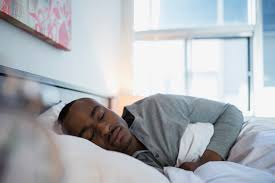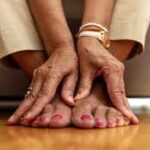Sleep Smarter: Natural Ways to Improve Your Sleep Without Medication

Meta Description: Struggling with poor sleep? Discover science-backed, natural strategies to improve sleep quality without pills. From bedtime routines to herbal teas, learn how to sleep smarter tonight.
Introduction: Why Sleep Quality Matters More Than You Think
In a world driven by deadlines, screens, and constant stimulation, sleep often becomes the first casualty. Yet, good sleep is essential—not just for feeling rested, but for supporting immune function, mental clarity, emotional balance, and long-term health.
“Beat the Pressure: A Comprehensive Guide to Lowering Blood Pressure Naturally.”
Buy book from Gumroad or Paystack
While many turn to sleep medications, they often come with side effects and don’t address the root causes of poor sleep. The good news? You can sleep better naturally, by making smart lifestyle choices and simple habit shifts.
The Hidden Dangers of Sleep Deprivation
Chronic sleep issues are more than just an inconvenience. Lack of quality sleep can lead to:
- Impaired memory and focus
- Weakened immune system
- Higher risk of heart disease and stroke
- Weight gain and metabolic disorders
- Mood disorders like anxiety and depression
According to the CDC, 1 in 3 adults don‚Äôt get enough sleep. If you’re one of them, it‚Äôs time to sleep smarter‚Äînot longer, just better.
1. Build a Consistent Sleep Schedule
Your body’s internal clock, or circadian rhythm, thrives on routine. Going to bed and waking up at the same time each day—even on weekends—helps regulate sleep hormones like melatonin and cortisol.
‚úÖ Tip:
- Choose a bedtime that allows at least 7–9 hours of sleep.
- Stick to it for at least 3 weeks to reset your rhythm.
2. Create a Sleep-Inducing Environment
Your bedroom should be a sanctuary for rest. Environmental factors play a major role in your ability to fall and stay asleep.
üåô Optimize Your Space:
- Cool it down: Keep the room between 60–67°F (15–19°C).
- Make it dark: Use blackout curtains or a sleep mask.
- Reduce noise: Try earplugs or a white noise machine.
- Declutter: A tidy space reduces anxiety and restlessness.
3. Power Down Screens Before Bed
Blue light from phones, tablets, and TVs suppresses melatonin, the hormone that makes you sleepy.
üì¥ Digital Detox:
- Avoid screens 1–2 hours before bedtime.
- Use “night mode” settings if screen use is unavoidable.
- Swap scrolling for a book or journaling.
4. Wind Down with a Bedtime Routine
Just like kids need a bedtime routine, so do adults. Repeating calming activities signals to your body that it’s time to sleep.
üåø Examples:
- Take a warm shower or bath
- Practice gentle stretches or yoga
- Listen to soothing music or a guided meditation
- Sip herbal tea (like chamomile or lavender)
- Write down your thoughts in a gratitude journal
5. Avoid Stimulants in the Evening
Caffeine can stay in your system for up to 8 hours, and nicotine and alcohol also interfere with your sleep cycle.
üö´ Watch Out For:
- Coffee, energy drinks, or chocolate after 2 p.m.
- Heavy meals close to bedtime
- Alcohol (which may make you sleepy but disrupts REM sleep)
6. Get Natural Light During the Day
Daylight exposure is crucial for regulating your circadian rhythm. It helps your body know when to feel alert and when to wind down.
☀️ Natural Light Hacks:
- Spend at least 30 minutes outdoors daily.
- Open your blinds first thing in the morning.
- Take short walks during lunch breaks.
7. Exercise—But Not Too Late
Regular movement promotes deeper, more restorative sleep. However, vigorous workouts right before bed can overstimulate you.
üèÉ Best Practice:
- Exercise at least 3 hours before bedtime.
- Include activities like walking, swimming, yoga, or resistance training.
8. Use Natural Sleep Aids Wisely
Certain herbs and supplements can support relaxation and better sleep without the side effects of medication.
üåø Sleep-Supportive Options:
- Chamomile: Calms the nervous system.
- Lavender: Reduces anxiety and promotes deep sleep.
- Magnesium: Relaxes muscles and supports melatonin.
- Valerian root: Enhances sleep quality (use occasionally).
- L-theanine: Found in green tea; promotes relaxation without drowsiness.
Always consult your healthcare provider before starting new supplements.
9. Manage Stress and Anxiety
Racing thoughts are a major culprit behind sleepless nights. Learning to manage your mental load is key to unwinding.
üßò Mind-Soothing Tools:
- Meditation or mindfulness apps like Calm or Headspace
- Progressive muscle relaxation
- Breathwork: Try box breathing (inhale 4, hold 4, exhale 4, hold 4)
- Gratitude journaling to release worries
10. If You Can’t Sleep, Don’t Force It
Lying in bed frustrated only increases anxiety. If you can’t fall asleep after 20–30 minutes, get up and do a quiet activity.
üåò Try This:
- Sit in dim light and read or listen to calming music.
- Avoid turning on bright lights or checking your phone.
Return to bed once you feel drowsy.
Success Story: How Ade Changed His Sleep Without Pills
Ade, a 35-year-old graphic designer, struggled with insomnia for two years. He tried sleep aids but hated the groggy side effects. After implementing a natural routine—cutting evening caffeine, setting a strict bedtime, using lavender oil, and journaling—he now sleeps soundly most nights and wakes up refreshed.
“I never realized how much my habits were hurting my sleep,” Ade says. “Now, I’m more productive, my mood is better, and I feel human again.”
Conclusion: Sleep Is the Foundation of Health
You don’t need medication to sleep better. By making intentional lifestyle shifts, you can improve sleep naturally, feel more energized, and enhance your overall well-being.
Start small. Choose one or two of these strategies and make them part of your nightly routine. With consistency and patience, you’ll notice real, lasting results—and finally wake up feeling like your best self.
¬Ý
üíî ‚ÄúShe said she loved me. And for fifty-two years, I believed her.‚Äù üíî
Buy The Book "The Longest Lie: A Husband’s Journey Through Love, Betrayal, and Redemption" From Gumroad
¬Ý






